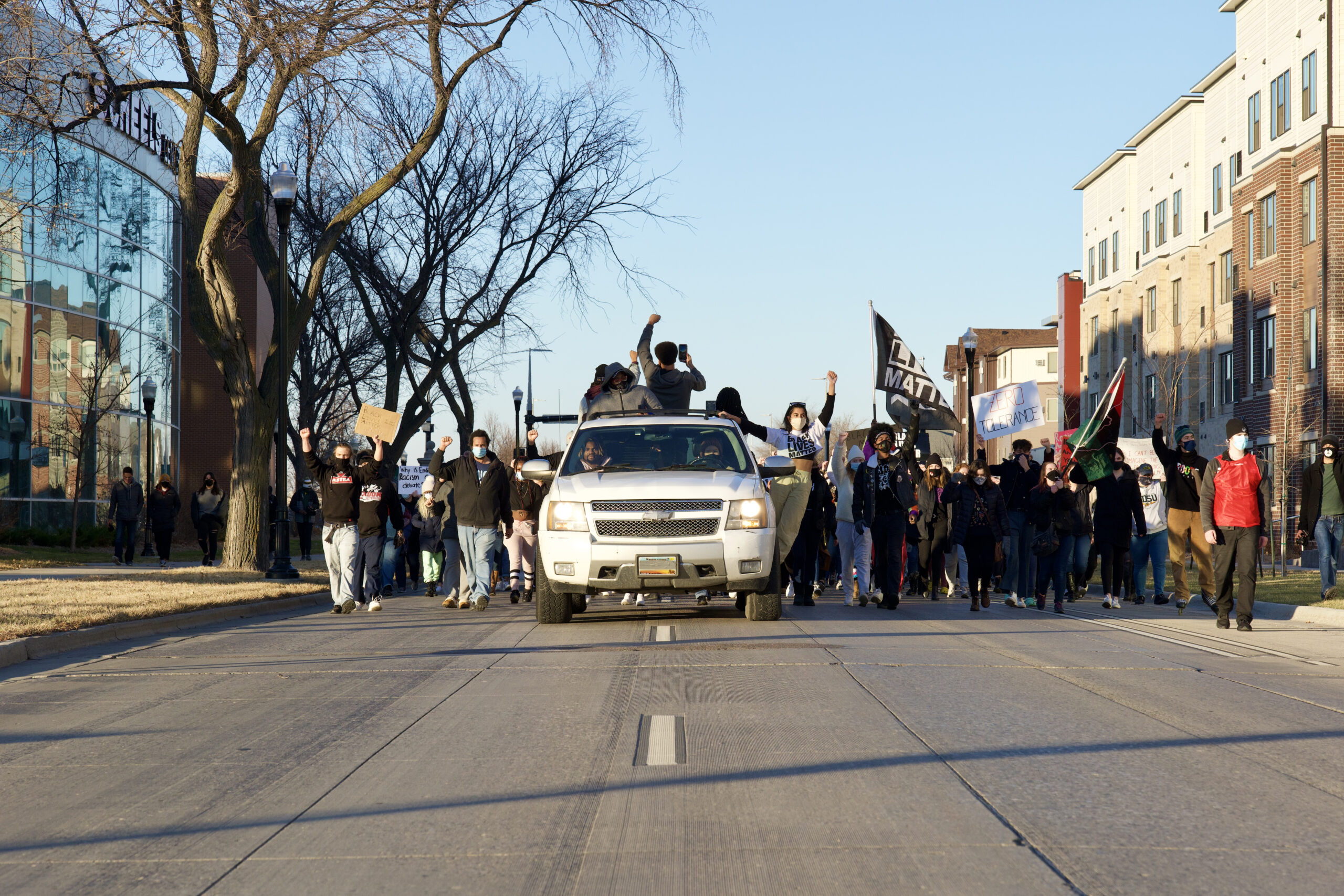
Protester marching down University Avenue.
After multiple racist incidents, NDSU students are demanding change
*By: Meghan Arbegast and Brayden Zenker*
Students, staff, faculty and community members took to the street to protest the response by North Dakota State University administration after knowledge of a racist group chat made by students came to light. Protestors marched Friday, Dec. 4, and Saturday, Dec. 5. Protestors marched the streets around campus calling for an end to racism on campus and demanding the university does better at punishing those students involved.
This incident, among others, was brought to the public’s attention from the Instagram account @blmndsu. Since the first post about the racial incidents on Nov. 30, @blmndsu has over 2,500 followers and over 1.5 million impressions. The account had continued to put pressure on NDSU administration to take action as well as inform the public of other racist incidents from students on campus.
The protests were organized by NDSU student activists dedicated to ensuring change from NDSU administration regarding racial incidents and creating an inclusive culture for minority students at the university. Some of the demands from these student activists include: racist incidents are included on student transcripts, diversity and bias training for students and staff/faculty, training for staff and faculty about how to support minority students, change the Code of Conduct to better protect minority students from discrimination, including a bias and discrimination statement in all syllabi, hire more people of color at the university, and create a response team with students and staff of color to investigate racial incidents.
One of those student activists is Aeshia Williams. Williams has done numerous interviews with local media outlets to bring these incidents to the public’s attention. “As a student on this campus I’ve experienced my own version of this criticism and discrimination,” Williams said at the protest on Dec. 4.
Williams continues to tell the story of a white female student bringing up false charges about her. The student had no evidence to back-up her claim, but Williams was informed she could potentially be expelled. The claim was ultimately thrown out as well as the possibility of Williams being expelled.
“I could have been expelled for something I didn’t even do,” Williams said. “[The students from the group chat] are still walking this campus freely on something we know they did.”
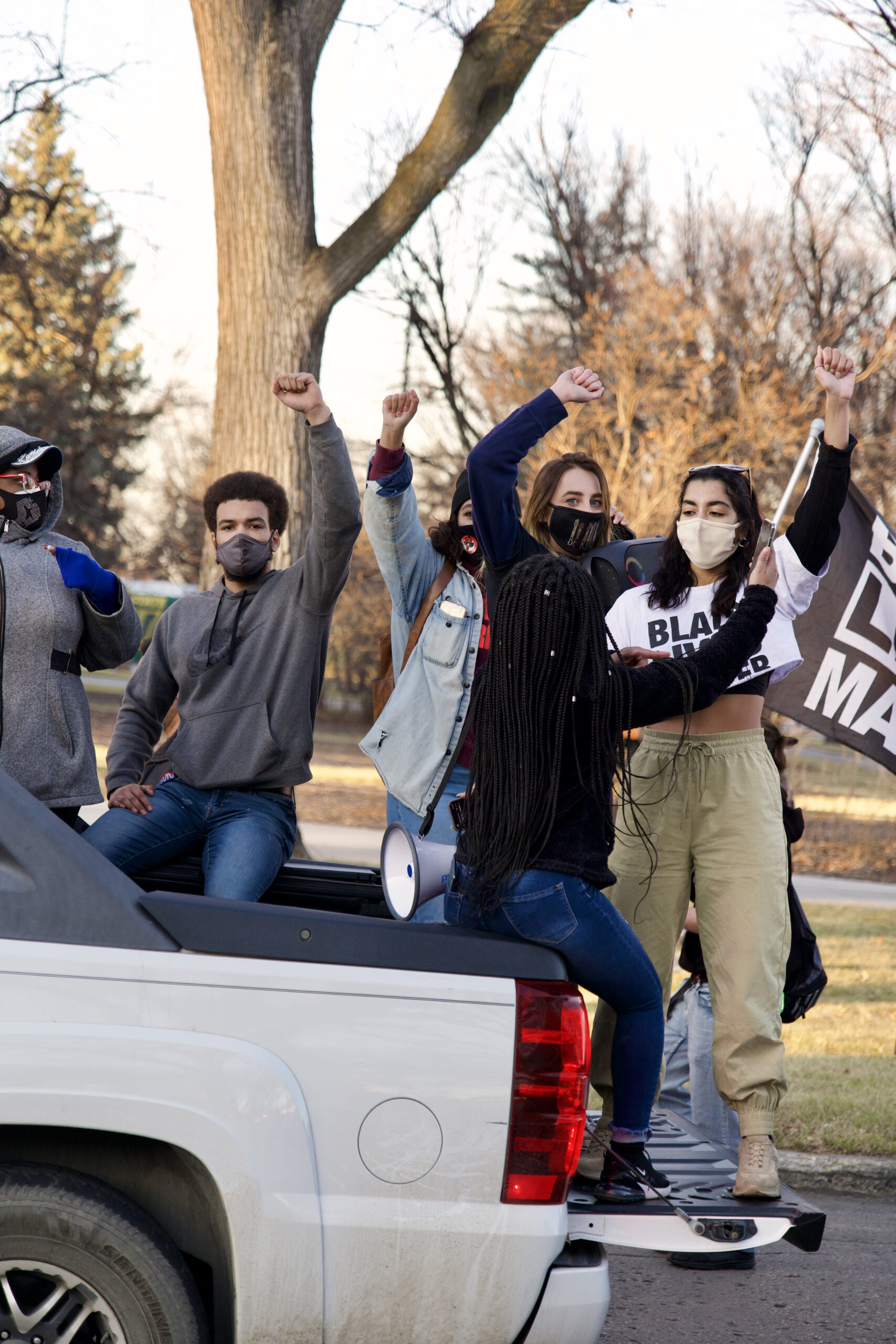
Student activists protesting on campus. 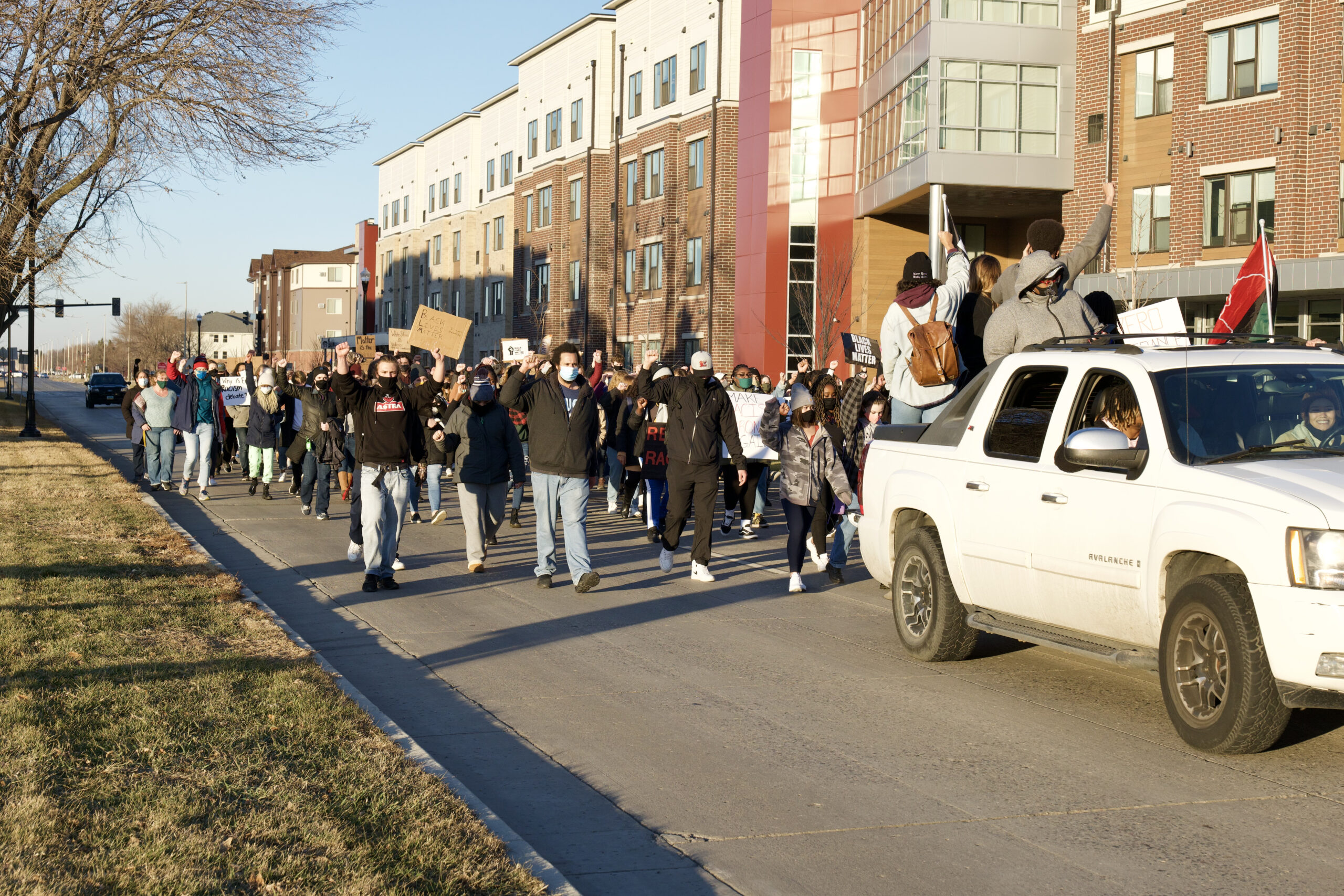
Marching down University Avenue. 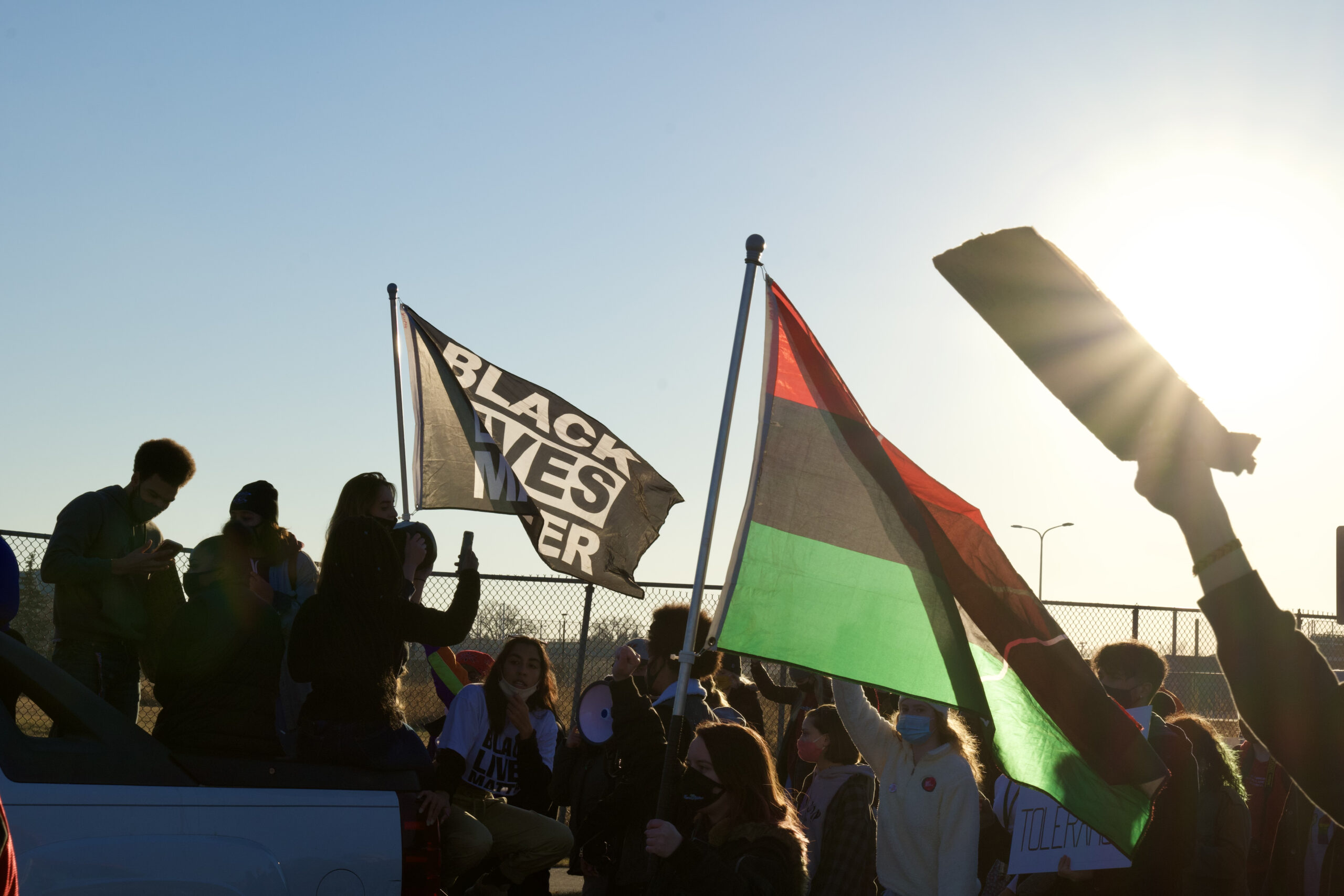
Protestors stopping along the march route.
Another student, Ambrosia YellowBird Howell, also spoke about her experience with racism at NDSU. “I know a lot about racism here at NDSU. It’s been really hard being here at NDSU, constantly surrounded by people who hate me and want me dead,” YellowBird Howell said.
“You have to work four times as hard to get a fourth of the recognition. We’re tired, we’re so tired,” YellowBird Howell said. “You can create all of the groups, clubs, and boards that you want. But, unless we discipline the racism at NDSU it’s going to continue.”
During the protest on Dec. 4, NDSU President Dean Bresciani was encouraged by protestors to make some remarks. “Well to be honest I didn’t come here to speak, I came here to listen and more importantly, I came here to hear you,” Bresciani said.
“There’s only one thing I wish was added today. I wish that the students who shared such vulgar inexcusable attitudes and languages, could be here to understand the pain they have caused. To understand the dismissive and divisive environment they have created.”
Bresciani went on to express the “irreversible damage” those involved have caused for the university community. Attendees called out that they wanted to know what he would do about their actions, but Bresciani responded back with “The question is what are we going to do about this.”
“Do black lives matter?” protestors asked Bresciani who didn’t respond, but thanked the crowd and stepped away.
Graduate student Frederick Edwards responded to president Bresciani’s remarks at the protest on Dec. 4. “What we are seeing now is excuses, comfortability with racism and complacency with what to do with racist actions,” Edwards said. “What the president said was what those students did made us look bad, made our school look bad. I could bring up 75 people from the audience and they could all tell you an experience similar to this one but didn’t make media platforms.”
“This is not anything new. The patterns are here, the patterns are continuing. The complacency with racism is continuing. It’s one thing to be tired, it’s one thing to be disappointed. But it’s another thing to become numb because this happens so much it’s routine.”
“I’m am tired of making excuses for why the school I go to doesn’t protect its Black students, doesn’t protect Indigenous students, doesn’t protect our trans students,” Edwards said. “It is a mockery to be a land-grant institution, a student-focused institution when the students are not the core focus.”
“The same people who want to make a change or say they want to make a change for have yet to show their face until today,” Williams said. “That is very telling fo this university. I have been going here and paying my money like every other white student for three years and I am treated differently. I’ve had to deal with racism every day at this university.”
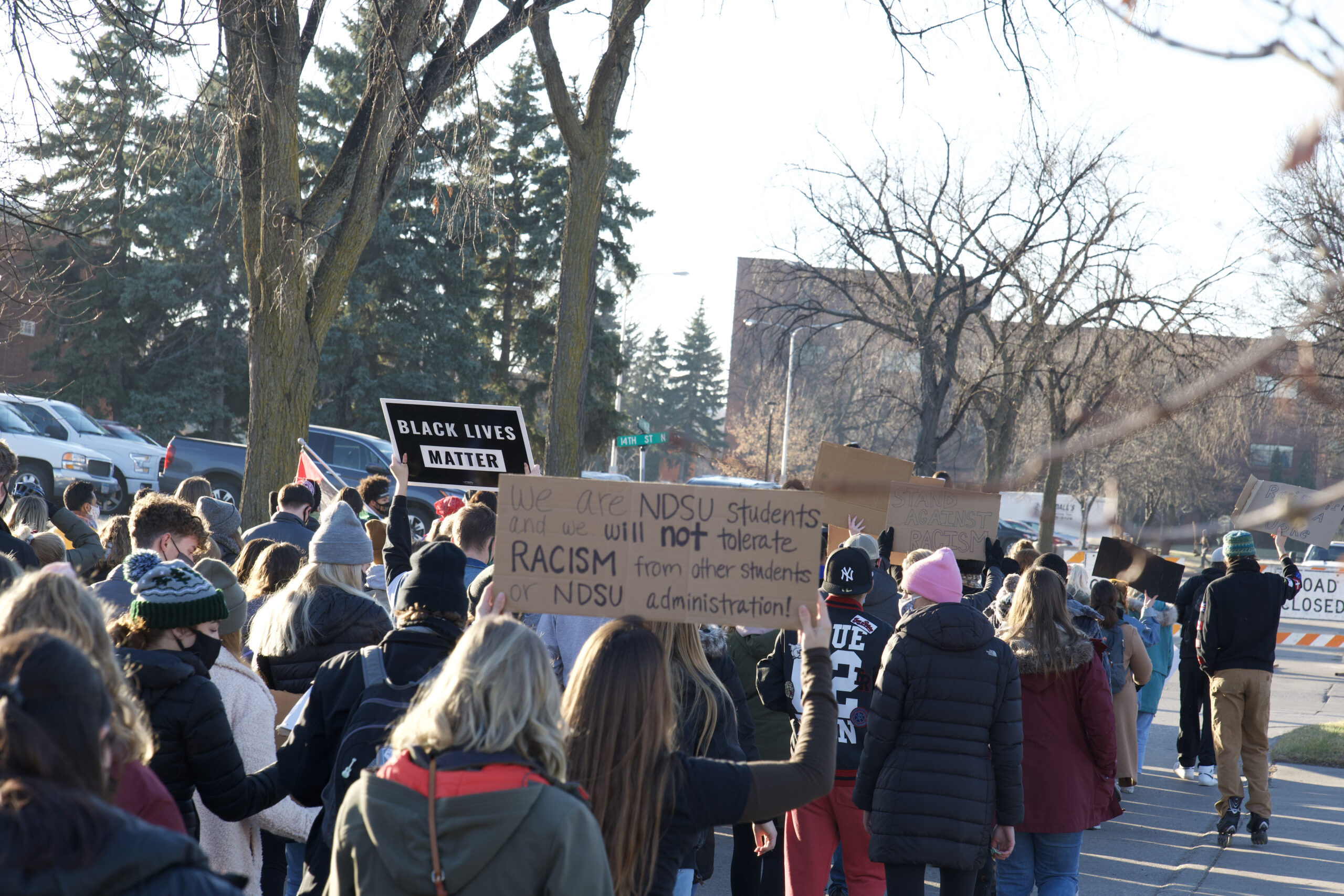
Many students marched with signs condemning the racist actions. 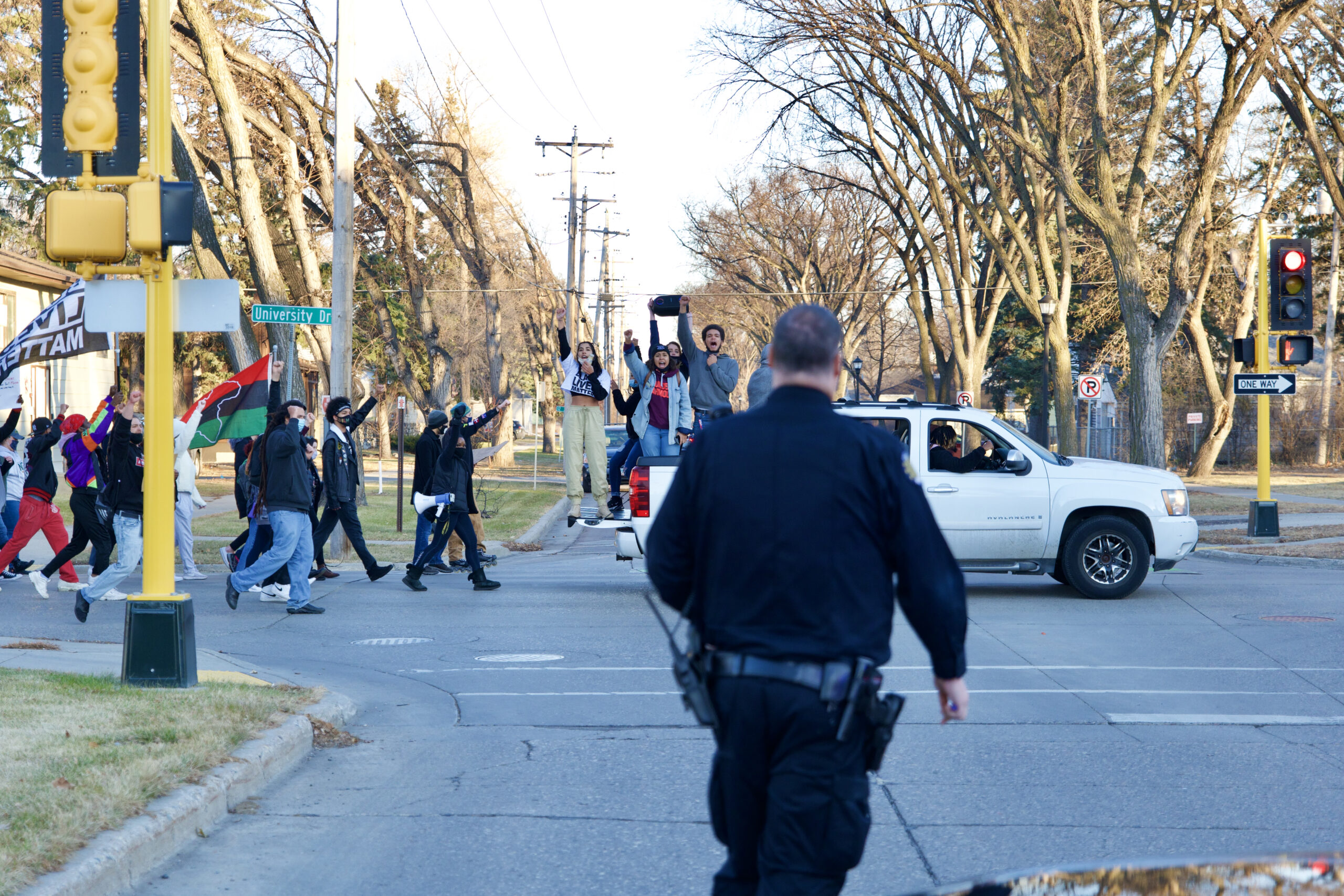
NDSU police patrolled university streets. 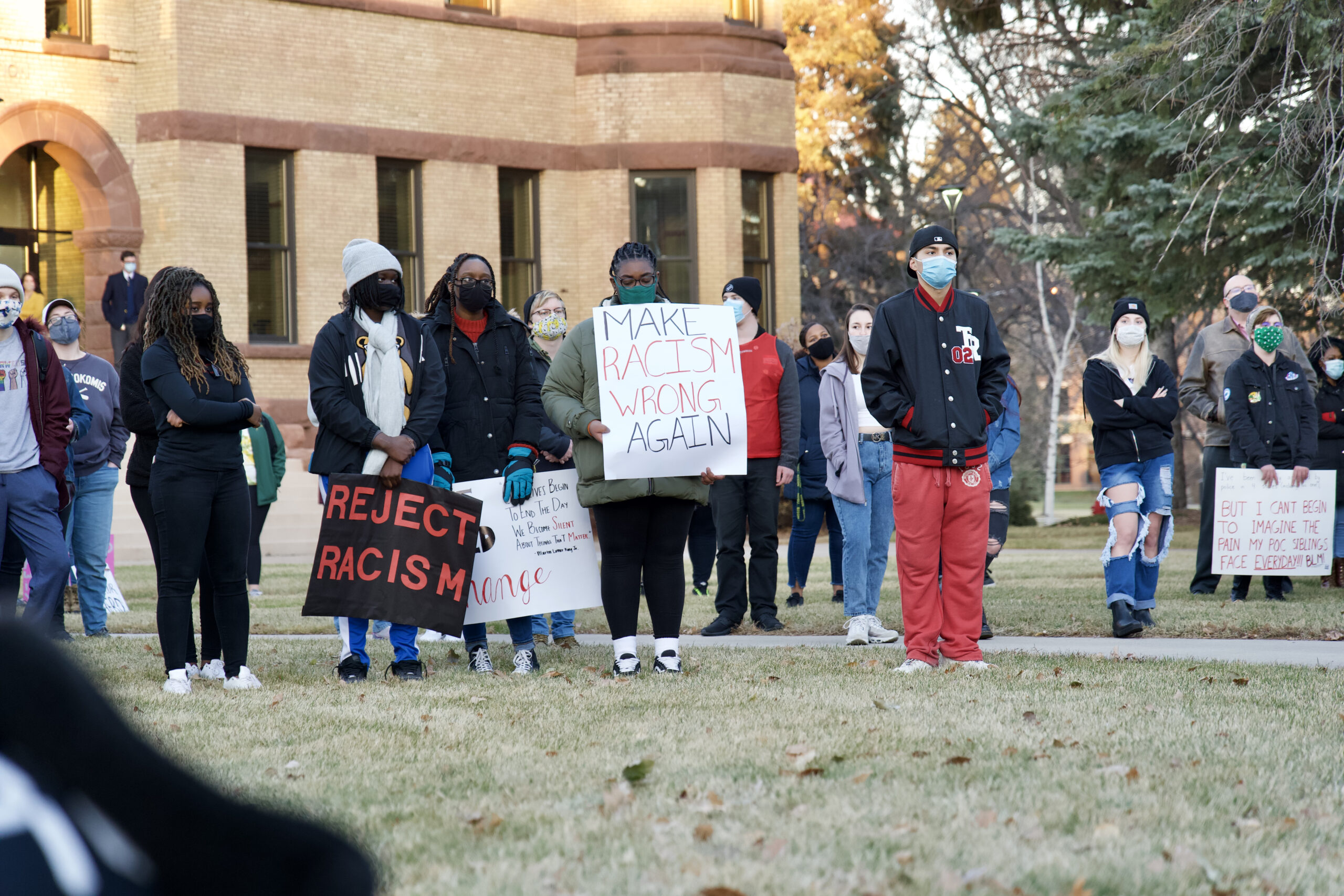
Students gathered at Putnam Hall following the march.
Claire, a Minnesota State University Moorhead student who preferred not to give her last name, wasn’t hopeful that Bresciani would address the protestors on Saturday. On Saturday, Bresciani marched with protestors but didn’t speak. Claire reiterated that as president, Bresciani has the power to make changes.
“As president of the university his job is to create an atmosphere free of white supremacy and free of discrimination and if he really had acheived his goal of creating bias-free NDSU, we wouldn’t be having this issue right now.”
Erica, a community member who also preferred not to share her last name, wants to see the administration be more explicit about what they are going to do, but is unsure what they can act on.
A lot of students have mentioned that the Student Code of Conduct needs to be reevaluated so punishments for racism are harsher.
“I don’t know how much more they can necessarily do besides changing something like that Code of Conduct because so much of it is just the environment of Fargo, North Dakota that let’s these things happen,” Erica added.
Claire also agrees that the Code of Conduct needs to be updated, but she added the NDSU culture matters when making changes as well. “You live in rural North Dakota with a largely white demographic, largely agricultural, you have to do more to create a community that brings in and makes people of other races feel comfortable here.”
Emily Frazier, the assistant dean of students at NDSU, commented about what actions administration is taking to change the university’s policies regarding race. “I want students to know that we definitely recognize how hurt our community is right now,” Frazier said. “We recognize that we can’t undo hurt, trauma and damage that has occurred. But, we do want to work to heal, to improve and we are very dedicated to finding the ways that we can make changes that will better reflect what our institutional values are.”
Frazier also explained how NDSU investigates racial incidents on campus. All racial incidents are investigated by the Equity Office. After the investigation, it is then determined if and what punishments students may receive. According to Frazier, punishments usually range from a warning, probation, suspension or expulsion. Along with these punishments students often receive education about discriminatory behavior and actions to prevent recurrence.
“There is a distinction between, for example, posting something that is racist in nature versus saying it specifically to another individual, threatening another individual or actively harassing someone,” Frazier said. “So particularly when those actions are being directed at another individual that’s when there is more action that can be considered and we may see some of those more significant outcomes from our continuum of sanctioning.”
Late Monday, Dec. 7, a group under the name NDSU European-American Student Union, sent an email to multiple administrators to put pressure on them to not change NDSU policies to better protect minority students.
The email included, “Your ideas are evil and antithetical to every fiber of our being. Your ideas are to the detriment of our White race, the one we love so much. Our beloved White race is the same White race that brought civilization to the hostile wilderness of North Dakota, stopping the senseless raiding and killing committed by the various Amerindian tribes.”
“We carry forth the very same pioneer spirit that guided our settler ancestors, and resolve to honor their legacy by defending our People against the depraved, self-flagellatory campaign of annihilation that you and your ilk wage.”
Matthew Friedmann, NDSU student body president, commented on the email sent out to administrators. “It’s incredibly disturbing, and I think that was obviously their intention,” Friedmann said. “Now is the time when we need to heal and come together.”
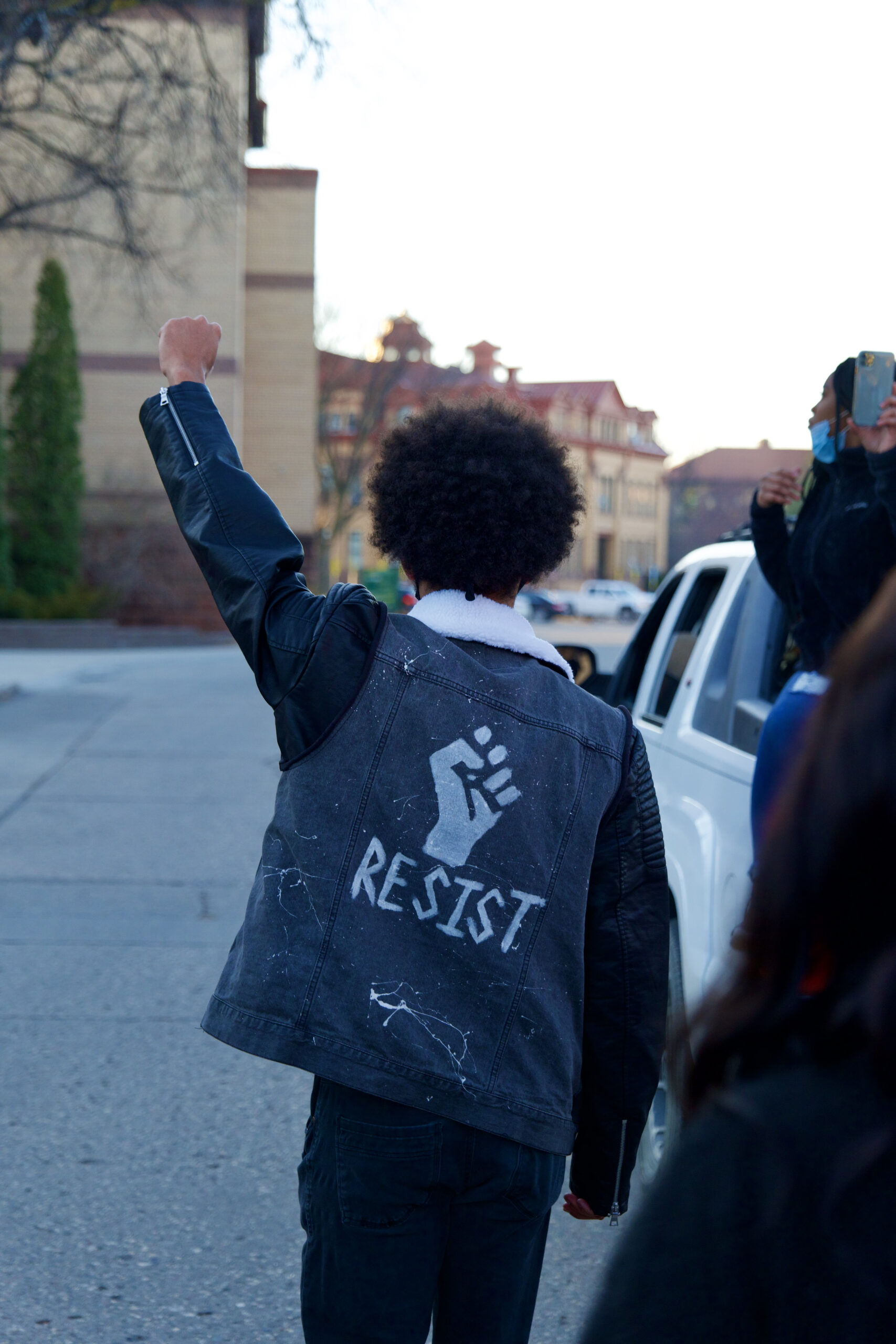
Protestors march past president’s house. 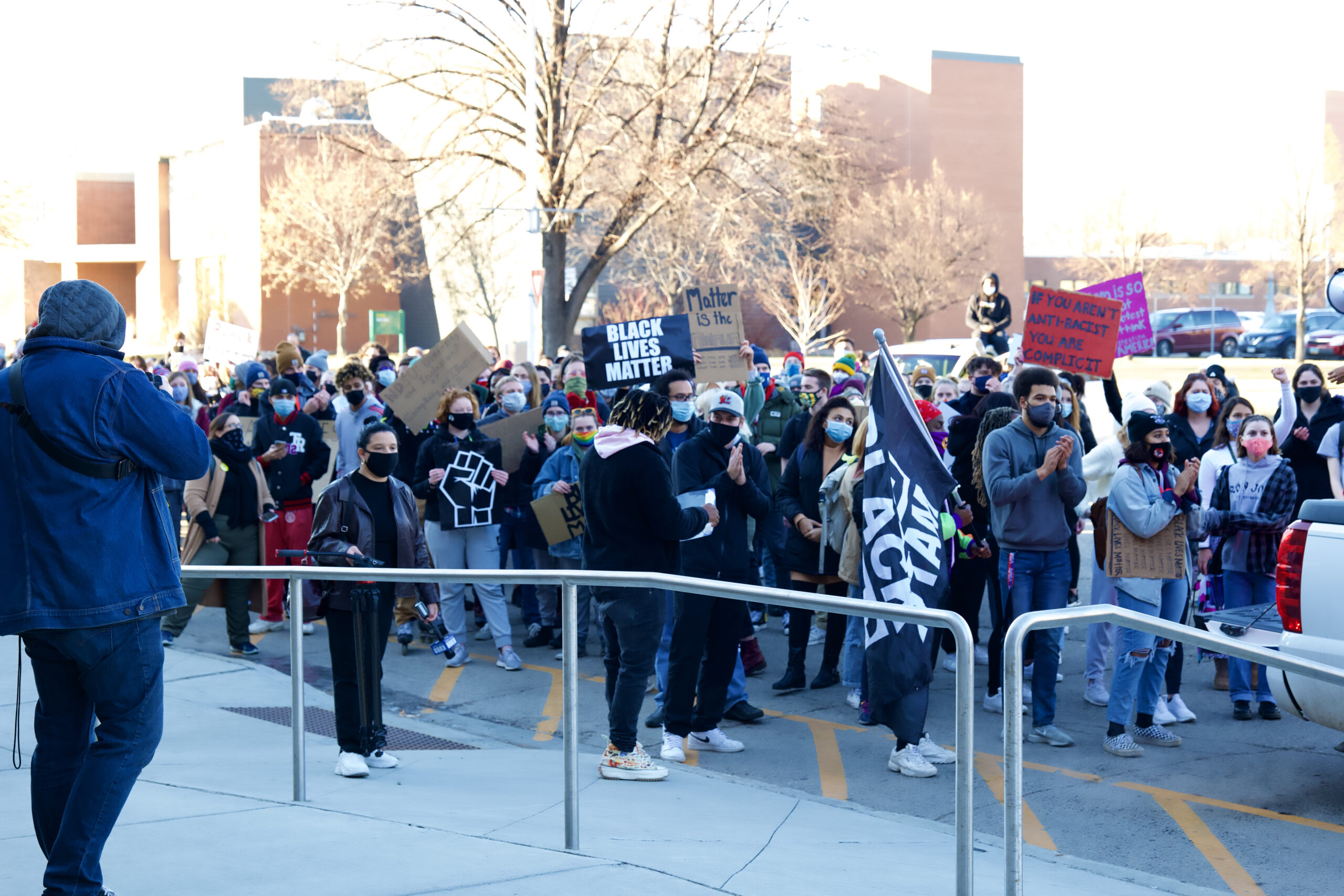
Organizers ensured protestors were wearing masks. 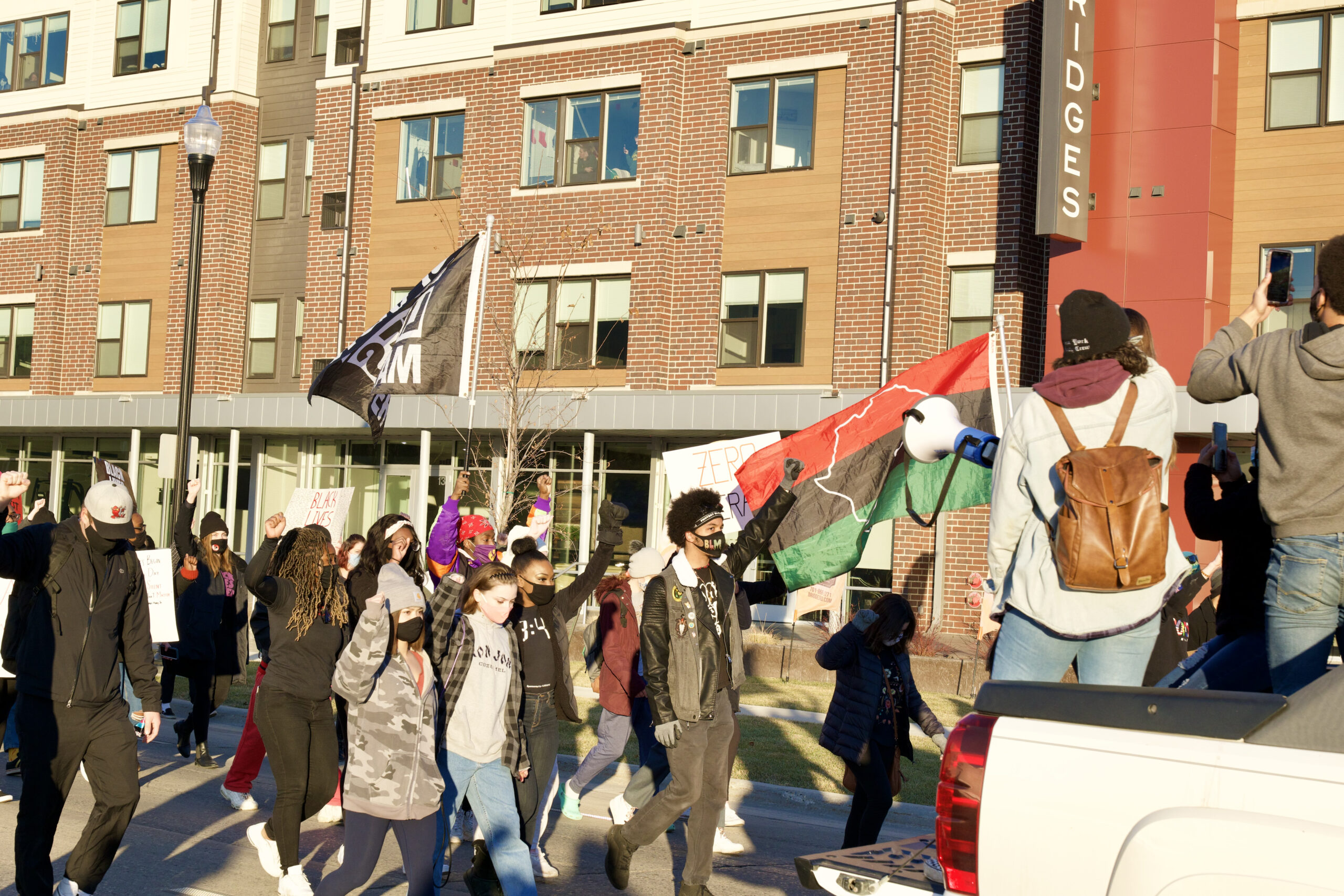
Protestors march silently with fists raised.
While many local media outlets were present at both protests, Claire hopes that the incidents at NDSU will gain national attention as well. Heather Hall, an NDSU alumnus, said that she sent out emails to NBC and MSNBC while a lot of people have tagged national media outlets in the @blmndsu instagram page posts.
Representative Ilhan Omar, an NDSU alumnus, made a comment on social media about the incidents saying, “As an NDSU alum, I am outraged. This type of racist hate should not be tolerated anywhere, especially not at institutions of higher education.”
Gaining the attention of a representative, Erica said this applies more pressure on the university to act. Claire also expressed how important it is for people to apply pressure on the university and administrators explaining that NDSU might care more if the sports community also applies pressure.
“I think if you’re trying to pressure an institute of higher education especially when it prides themselves so heavily on their D1 athletic status and prides themselves so heavily on their athletics, that you have to hit them where it matters” Claire said. “Weighing in from politicians is one thing, but if a sports community condemns it, then it’s a lot more impactful.”
Rep. Omar wasn’t the only high caliber politician to comment on the racial incidents happening at NDSU. During a round-table discussion, Massachusetts Sen. Elizabeth Warren commented about the inequality at NDSU.
“When we get a different Secretary of Education, what happens on campus, racial incidents on campus, will be treated differently,” Warren said. “We have a different Department of Justice and a different Civil Rights Division, you can expect more help from Washington.”
“You have a right to demand more from a President and Vice President who have empathy and who are determined to build an America that works for everyone. Who are not out there to try to stir up as much racial division and hatred as possible, but to create opportunities for everyone.
